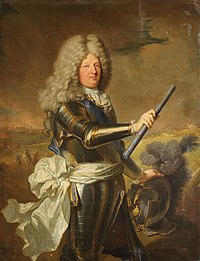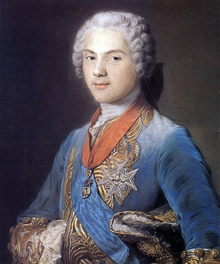 |
| The Grand Dauphin |
He was greatly loved by the people - especially by the other-wise continuously troublesome Parisians - due to his generous nature and rather liberal behaviour. When sent to war he further endeared himself by recognizing the brave deeds of those far below him. So far so good. But there is nothing about the Grand Dauphin that suggests that he would have been a great King. That nature which so charmed the common people was completely broken by the upbringing given to the Sun King's heir. His tutors rained knowledge over him but very little of it managed to take hold which just caused them to push harder. As a result, the Grand Dauphin remained thoroughly uneducated (considered his rank) and throughout his life remained opposed to books and learning.
The Grand Dauphin might have been generous but he was lazy as well almost to the limit of apathy. It was infamously said of him that he could spend an entire day sitting in an armchair doing nothing but tapping his cane against the parquet floors. Louis XIV wanted his heir to be present at council meetings but never allowed him to actually do anything. In this manner, the Great Dauphin never acquired the skill of leading or even administering his court. So, although his great love of art resembles his father, there is little to suggest that the Great Dauphin would have been a good King. He died in 1711 - just four years before his father.
 |
| Louis, Duc de Bourgogne |
The monarchy might have looked completely different had the Petit Dauphin ever taken to the throne. He was convinced that the monarchy should govern through councils that would work as intermediaries between the King and his people. Despite this revolutionary perspective there is little to tell us how the people saw him. And perhaps that silence is enough explanation. It might be that Louis simply did not make an impression on the common people which could both be to his advantage and his disadvantage. On one side it might have done him good that he was not associated with the more scandalous fractions at court. But then again it might mean that his would-be subjects never really connected with him. Either way, it was not to be. The Duc de Bourgogne died in 1712 in an epidemic that claimed the lives of his wife and son as well.
There is not much to say about the next Dauphin. As the son of the Duc de Bourgogne he was also named Louis but was swept away by the same epidemic that killed off his parents. He died at the age of 5 years in 1712.
 |
| Louis Ferdinand |
All these attributes made Louis Ferdinand very popular among the people who saw him as a stark contrast to his father. By this time Louis XV was no longer the beloved by his people and his behaviour as a womaniser was well-known. Louis Ferdinand was the direct opposite who was also interested in the art of governing a country - something Louis XV never was. Still, Louis Ferdinand was never allowed to take part in the actual decision making which appears to have been a familiar strategy among the reigning Kings. Finally, Louis Ferdinand was fascinated by military tactics and was reluctantly kept from the battlefield by his father. The French people loved a King who knew how to win wars, so this was another plus for the Dauphin. By all aspects, Louis Ferdinand might actually have prevented the revolution with his plans for a functional economy and good common sense. To the great loss of France, Louis Ferdinand died on 20 December 1765.

No comments:
Post a Comment